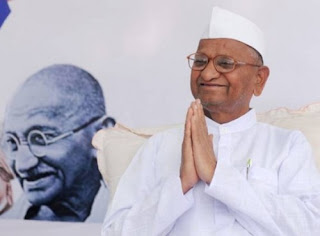.jpg)
Corruption is so deep in India that it has managed to penetrate the psyche of its citizens who, to reconcile with this horrid reality, condone it as a part of their daily lives. It is a fact that bribing a peon at a government expedites your case file and of course a little more in the higher official's pocket can positively effect the outcome as well. In this downward spiral the middle class usually finds itself in, the majority lower class (which is not able to afford bribing) is simply pulverized between the corrupt system and realities of their hideous living standards. Naturally, such a democratic nation becomes a breeding ground for emotive movements that may overlook the fundamentals of democracy which seemingly had lost its effectiveness.
Such is the movement by Anna Hazare, a social activist from Bhingar (Maharashtra, India), who rose to "Gandhian" pedestal for inspiring a head on collision with corruption. I believe in Hazare's honest intentions but I am equally perturbed by the fact that his team has failed to understand the nature of the monster they are upholding. The monster I am talking about is the center of Hazare's movement,
the Jan Lok Pal Bill, seeking the creation of
Jan Lok Pal, an independent investigation body above the President and the Prime Minister to eliminate corruption via a fast track courts.
At first glimpse, an independent anti-corruption body seems such a poetic solution to the corruption conundrum in India but ponder on the concept for an unbiased moment and the fundamental flaw is glaringly visible. Jan Lok Pal is a parallel government and has absolutely no balance and check mechanism attached to it. In other words, where are these
Lokpals (officials to run this anti-corruption body) going to come from? Jupiter? Mars? Nope, you guessed it right, they are going to come from the same bureaucratic lineage present in our government that we are trying to clean in the first place. Justice Katju, former Supreme Court Judge, pinched part of the right nerve by saying:
"[Jan Lok Pal Bill] will immediately double the corruption in the country, far from abolishing it because the Jan Lok Pal Bill brings all public servants purview of the Jan Lok Pal... to investigate and supervise the investigation of two crore [public servants] will require around one lakh Lakpals... you have to provide them [Lokpals] salaries, staff, etc., and most of them will become blackmailers considering the low level of morality prevailing in the country"
Even though I think Katju grossly simplified the corruption issue by solely linking it with "low level of morality prevailing in the country", I agree with his foresight in deducing that Lokpals will be future blackmailers and hence the next and brand new tier of corruption.

I think we don't realize that corruption is not an entity but rather an idea and the counter to it is the wholly progress of the nation. Currently, India is improving in bits and pieces and the citizens who fortuitously find themselves in such minute "sections of improvement" refuse to deal with lagging downtrodden. We cannot fight corruption, and any anti-social and backward idea, if the entire nation fails to collectively tread towards progress. On one hand, benefits and salaries for lower rung government officials should be improved and simultaneously, other social issues like homosexuality and woman trafficking must be dealt with, broadening the psyche of common man to coax them into eliminating social evils on their own. However, one must not forget that corruption-free democracy is an idealistic state which in theory only a communistic country can reach at the cost of their citizen's basic freedoms. So, we have to choose between a democracy with higher living standards at the cost of localized but inherent corruption or a communistic corruption free nation? I think the answer is obvious.
Before I detour further from the central issue (of Lokpal), at this point, I would like to interject what Yogendra Singh Yadav, an Indian social scientist, said:
"This is not a movement about Anna Hazare, the person... it is about every person, every village, every town, discovering their own little Anna. It is not about Lokpal... in no movement in the world people get into fine prints, movement was about people discovering they matter, that they can do something, that they are not helpless. And it is not only about corruption, this is about demanding a better life, a better polity... this is why they have the confidence, this is why the politicians feared them."

I do empathize with the romanticized descriptions of Hazare's movement but I think Yogendra Yadav talks about what the movement should have been and not what it has reduced to. My point is that Hazare's movement might have started with an intent to end corruption via Jan Lok Pal bill but at this time, as the theatrics of the movement suggest, Jan Lok Pal, the anti-corruption body, to be its crux and the promotional card.
I am, therefore, forced to analyze the greater picture encompassing the protagonist of this movement, Anna Hazare. I wouldn't be surprised if Hazare, after the bedazzling stardom, has wet dreams about his name being mentioned in the same breath as Mahatma Gandhi. Is it really the corruption, as an idea, that he still wants to fight or is the titillating iconic status that he wants to perpetuate at the cost of the parallel government?
Whatever be the case, one cannot deny the fact that Hazare's movement has brought much needed light on the horridly dark reality of corruption in the country. But the fact that the movement did not carry itself forward from this one Jan Lok Pal parallel government, I cannot endorse it. I am sure Hazare did not start as a dishonest social activist who was hungry for authority but I am dubious that he didn't end up morphing into one.


















.jpg)




